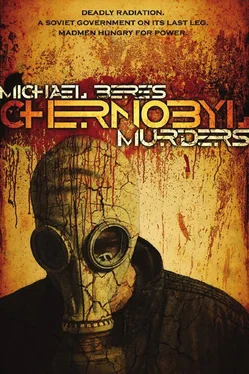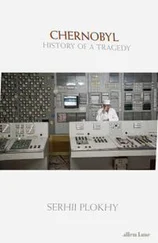Michael Beres - Chernobyl Murders
Здесь есть возможность читать онлайн «Michael Beres - Chernobyl Murders» весь текст электронной книги совершенно бесплатно (целиком полную версию без сокращений). В некоторых случаях можно слушать аудио, скачать через торрент в формате fb2 и присутствует краткое содержание. Жанр: Триллер, на английском языке. Описание произведения, (предисловие) а так же отзывы посетителей доступны на портале библиотеки ЛибКат.
- Название:Chernobyl Murders
- Автор:
- Жанр:
- Год:неизвестен
- ISBN:нет данных
- Рейтинг книги:4 / 5. Голосов: 1
-
Избранное:Добавить в избранное
- Отзывы:
-
Ваша оценка:
- 80
- 1
- 2
- 3
- 4
- 5
Chernobyl Murders: краткое содержание, описание и аннотация
Предлагаем к чтению аннотацию, описание, краткое содержание или предисловие (зависит от того, что написал сам автор книги «Chernobyl Murders»). Если вы не нашли необходимую информацию о книге — напишите в комментариях, мы постараемся отыскать её.
Chernobyl Murders — читать онлайн бесплатно полную книгу (весь текст) целиком
Ниже представлен текст книги, разбитый по страницам. Система сохранения места последней прочитанной страницы, позволяет с удобством читать онлайн бесплатно книгу «Chernobyl Murders», без необходимости каждый раз заново искать на чём Вы остановились. Поставьте закладку, и сможете в любой момент перейти на страницу, на которой закончили чтение.
Интервал:
Закладка:
“Not personally. I only know he’s an engineer. I’m on a maintenance crew. We travel from building to building. I know his name because he once directed work we were doing.”
“Were you at the plant when this accident occurred?”
“No. I was at home.”
“Tell me what you saw and heard. Start from the time of the accident.”
“It was some time after midnight Saturday… yesterday. One loses track of time after being awake so long. I was up late and couldn’t sleep. When I went outside, I saw smoke and what looked like fire in the sky. A while later, trucks sped past, one pulled up, and my neighbor jumped off the back end. He said one of the reactors exploded. He was there, at the station, and said radiation was released. We tried calling around to see what was up but couldn’t get through to anyone. By dawn there were all kinds of rumors. My neighbor had his dosimeter on. He got a small dose while escaping. Later in the morning, he comes over and says the exposure is going up. Right there in his apartment he’s getting exposed. So we brought our families to Kiev. He has a little shitbox of a car. We all packed into it, it kept running, and here we are.”
“When did you arrive?” asked Lazlo.
“About midnight.”
“When did you leave?”
“It was two or three in the afternoon by the time we got everyone together.”
“It took nine hours to drive the hundred kilometers from Pripyat to Kiev?”
“By the time we got going, the dosimeter was really going up.
We didn’t want to take the main road because it went back east past the plant before turning south. We drove southwest, away from the plant and the direction of the wind. The back roads were terrible, and we had to stop for directions several times. We finally followed the Uzh River all the way to Korosten and then took the highway back to Kiev.”
“Were there many others trying to escape?”
“No. We thought it odd, but there were only a few cars. It’s probably because there was no news.”
“Nothing on the local radio and television stations?”
“Nothing but music,” said Tupolev. “They even skipped the regular news broadcasts.”
“Is there anything else you can tell me?” asked Lazlo.
Tupolev looked down at his hands. “One more thing. Your brother might have been on duty during the accident. My neighbor said they were doing an experiment and several engineers were there. They were supposed to shut the reactor down. I guess something went wrong.”
“Could my brother have been on one of the trucks you saw?”
“I’m afraid I don’t know,” said Tupolev.
“Your neighbor, the one who came to Kiev with you… would he know?”
“I’ll write down his name and the address of his parents.”
Lazlo quickly supplied pen and paper. While Tupolev wrote the information, Lazlo looked at the faces of the others in the apartment. They looked like visitors to a wake who must now face the next of kin. During the conversation, Tamara came to his side and put her arm about him, holding him gently.
Yuri Tupolev’s neighbor said the engineers and technicians at the plant ran from the control room after an initial explosion. He knew nothing more. As for Mihaly, he might have escaped because several cars and trucks were seen speeding from the plant.
After questioning Yuri Tupolev’s neighbor, Lazlo stopped at a phone and tried to call Pripyat. Again, the call could not go through and the operator was unable to give a reason. Lazlo called militia headquarters and spoke to the sergeant on duty. The sergeant knew nothing about an accident at Chernobyl, and neither did anyone else at headquarters. However, Deputy Chief Investigator Lysenko, Chkalov’s right-hand man, was at the city’s boundary on the road leading north and had called for additional uniformed men for some kind of roadblock. Chkalov was not in, and the sergeant could give no further information.
Before driving to the so-called roadblock on the north end of the city, Lazlo dropped Tamara off at her apartment.
“Thank you for being so understanding, Tamara.”
“How could I not be understanding? He’s your brother.”
“I mean about going with me.”
“I only wanted to ride in your speedy Zhiguli and listen to the two-way radio.” Tamara placed her hand on his knee. “Promise me something, Laz. If you decide to drive to Pripyat, take the long way around.”
Tamara put her arm around him, pulled him close, kissed him.
As she walked up the steps to her building, Lazlo paused a moment.
Seeing Tamara walk away after the weekend they had spent together, and speculating about the trouble ahead, made him feel the elusive-ness of life and its pleasures. He put the Zhiguli in gear and sped up the street.
There was no mention of a nuclear incident on the Zhiguli’s radio, not even when he managed to tune to Voice of America. He tried the Radio Free Europe frequency, but there was no morning programming. For a moment he began to wonder if it was all a mistake.
But the roadblock at the outskirts of the city where the extension of Boulevard Shevchenko curved north was no mistake. Two marked militia cars blocked the road, and uniformed officers turned traffic back to Kiev. Amid the officers, dressed in his Sunday suit, was Deputy Chief Investigator Lysenko, who always wore what looked like a Sunday suit, the uniform of one who seeks promotion. Lazlo pulled to the right of the waiting vehicles and walked to where Lysenko stood in the morning sun, staring at the barren road to the north.
Lysenko turned. “Good morning, Detective Horvath. Are you here to help?”
Rather than take time to explain, Lazlo used a direct approach.
“The chief sent me. He said you should fill me in.”
“It’s the nuclear plant at Chernobyl.”
“I’ve already heard rumors,” said Lazlo, wanting to get on with it. “Do you know if anyone was killed or injured?”
“All I was told is no one should try to drive there,” said Lysenko.
“The republic militia has blocked the road farther north. Apparently there’s some radiation, but the chief said civilians are to be told nothing except the road is closed. It’s already caused arguments.
These people with their Sunday plans.”
Lysenko looked up the road. “Something is puzzling about this.
I thought there would be heavy traffic from the north. So far we’ve only had a few cars come through. I’m beginning to wonder if there really was an accident at the plant.”
“Did you question the people coming south?”
“My orders were simply to let no one go north.”
Lysenko’s profile, with his pointy chin and upturned nose, suddenly looked foolish. Lazlo wanted to call him what he looked like, but instead he said, “You didn’t question anyone or take names?”
“No. My orders were simply to let no one go north.”
“If you’re still wondering, my fine deputy chief, why there are so few cars, perhaps a bit of logic is in order.”
Lysenko turned and frowned at Lazlo. “What do you mean?”
“One look at a map would tell you the two largest towns up there, Chernobyl and Pripyat, are very near the nuclear facility bordering this road. If there is radioactivity in the area, citizens might be directed away from this road. If you wish to see accident refugees, I suggest you put men on the road from Korosten!”
Lysenko stared at Lazlo in obvious anger, saying nothing.
After Lazlo sped off, Lysenko turned and trotted to the front of the roadblock.
“What did he want?” asked one of the uniformed men.
“He probably wanted to drive the two hours to the nuclear plant so he could make himself into a hero,” said Lysenko.
“But his brother works there. Didn’t you tell him about all the fire trucks and buses sent from Kiev?”
Читать дальшеИнтервал:
Закладка:
Похожие книги на «Chernobyl Murders»
Представляем Вашему вниманию похожие книги на «Chernobyl Murders» списком для выбора. Мы отобрали схожую по названию и смыслу литературу в надежде предоставить читателям больше вариантов отыскать новые, интересные, ещё непрочитанные произведения.
Обсуждение, отзывы о книге «Chernobyl Murders» и просто собственные мнения читателей. Оставьте ваши комментарии, напишите, что Вы думаете о произведении, его смысле или главных героях. Укажите что конкретно понравилось, а что нет, и почему Вы так считаете.












